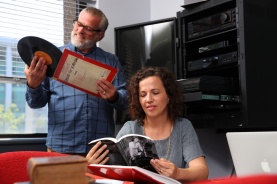Dr. Jacqueline Warwick
What do you think is the best part of being a musicologist? MyÌıfavouriteÌıpart of being a musicologist is that I get to earn my living listening, thinking, talking and writing about music. Music is so central to the human experience, and it marks the most joyful and the most painful parts of our lives because it can so often express things that canât be put into words. It is a privilege to be able to explore the power of music with students and colleagues.
 Ìı
Ìı
What areas / topics of research do you specialize in?ÌıÌı My first book (based on my PhD dissertation) was about the girl groups of the early 1960s: groups of (largely) untrained singers who created songs articulating the experience of being a teenage girl during a time when youth culture and expectations for ânice girlsâ were in turmoil. 60s girl groups like the Shirelles, the Ronettes, the Supremes and theÌıShangriLasÌıwere important symbols for girls around the world. The broke gender, race, and class barriers, and they were central to the ways that youth experience was reinvented. Iâve also written about other popular music topics and feminist issues.
Ìı
What do you like best about living in the City of Halifax?ÌıÌı I love to live in a place that is by the sea and has so much beauty and history around. I'm also happy with the arts and music scene here: this small city really punches above its weight!
Ìı
What projects are you currently working on?Ìı Iâm now researching the phenomenon of child stars in music, in preparation for a new book to be calledÌıChildâs Play: Musical Prodigies and the Performance of Childhood. Iâm interested in the longstanding fascination with precocious child performers; why do we like so much to see little children perform like adults? And what do children get out of that experience? Iâm interested in the usually sentimental, old-fashioned repertoire assigned to children and the ways that child prodigies symbolize both the future and the past.
Ìı
Where can we find/read some of your work?Ìı Girl Groups, Girl Culture: Popular Music and Identity in the 1960sÌıwas published with Routledge in 2007, and there are copies in local libraries.ÌıVoicing Girlhood in Popular Music, which I co-edited with Allison Adrian in 2016, is also on Routledge, and Iâm very proud of the terrific authors who contributed to this collection. Iâve also published reviews and articles in journals such asÌıJournal of Popular Music Studies, Journal of the American Musicological Society,ÌıandÌıJournal of the Society for American Music.
Ìı
What advice can you offer any interested musicology students?Ìı Choose grad school if you are passionate about research! And choose a topic that involves listening to music you really like.
Ìı

